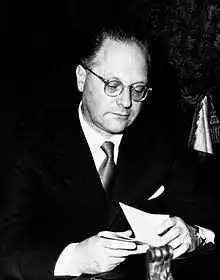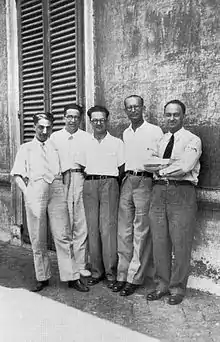Edoardo Amaldi
Edoardo Amaldi (5 September 1908 – 5 December 1989) was an Italian physicist. Amaldi coined the term “neutrino” in conversations with Enrico Fermi distinguishing it from the heavier “neutron”.

Life and career
Amaldi was born in Carpaneto Piacentino, the son of Ugo Amaldi, professor of mathematics at the University of Padua, and Luisa Basini.[1][2][3][4]
Amaldi graduated under the supervision of Enrico Fermi and was his main collaborator until 1938, when Fermi left Italy for the United States. In 1939, Amaldi was drafted into the Royal Italian Army and returned to physics in 1941.

After WWII, Amaldi held the chair of "General Physics" at the Sapienza University of Rome, rebuilt the post-Fermi school of physics, and was the co-founder of the Italian National Institute for Nuclear Physics and of ESRO. He was the general secretary of CERN at its early stages when operations were still provisional, before September's 1954 official foundation.[5][6][7][8] He pioneered in Europe the search for gravitational waves.
His main scientific results were on slow neutrons in the Fermi group, and the evidence for antiproton annihilations with emulsion techniques, somewhat contemporary to its production in accelerators by Emilio Segrè and collaborators. Amaldi co-authored about 200 scientific publications ranging from atomic spectroscopy and nuclear physics to elementary particle physics and experimental gravitation, as well as textbooks for secondary schools and universities. He also wrote historical-scientific books; for example, a biography of his friend Ettore Majorana who mysteriously disappeared. He was elected a Foreign Honorary Member of the Soviet Academy of Sciences in 1958[9] and American Academy of Arts and Sciences in 1962.[10] In 1963 he became foreign member of the Royal Netherlands Academy of Arts and Sciences.[11] On 25 April 1968, he was elected as a Foreign Member of the Royal Society.[12]
Amaldi died unexpectedly on 5 December 1989, still in full activity, while he was president of the Accademia dei Lincei, of which he had been a member since 1948.
The third Automated Transfer Vehicle of the European Space Agency bore his name.[13]
See also
References
- Rubbia, C. (1991). "Edoardo Amaldi. 5 September 1908 – 5 December 1989". Biographical Memoirs of Fellows of the Royal Society. 37: 2–31. doi:10.1098/rsbm.1991.0001.
- Salvini, G. (1992). "Edoardo Amaldi (5 September 1908-5 December 1989)". Proceedings of the American Philosophical Society. 136 (3): 425–429. JSTOR 986916.
- "Edoardo Arnaldi e il rifiuto delle applicazioni militari della Fisica nucleare" (PDF). Archived from the original (PDF) on 2016-03-04. Retrieved 2011-02-16.
- Rubbia, Carlo (1991). Edoardo Amaldi : scientific statesman (PDF). ISBN 978-92-9083-042-9.
- "Edoardo Amaldi, 1908-1989". CERN Courier. 30 (1): 27. February 1990.
- "Recollections of Edoardo Amaldi". CERN Courier. 39 (3): 37. April 1999.
- "Edoardo Amaldi: a true statesman of science". CERN Courier. 48 (10): 13–17. December 2008.
- "47th session of CERN council: departure of Edoardo Amaldi". CERN Courier. 12 (1): 5–6. January 1972.
- Амальди Эдоардо. ras.ru
- "Book of Members, 1780-2010: Chapter A" (PDF). American Academy of Arts and Sciences. Retrieved 17 April 2011.
- "Edoardo Amaldi (1908 - 1989)". Royal Netherlands Academy of Arts and Sciences. Retrieved 19 July 2015.
- Record at the Royal Society's archive
- "Third ATV named after Edoardo Amaldi". ESA Bulletin (142): 59. 2010. ISSN 0376-4265.
External links
| Wikimedia Commons has media related to Edoardo Amaldi. |
- Oral History interview transcript with Edoardo Amaldi 8 April 1963, American Institute of Physics, Niels Bohr Library and Archives
- Oral History interview transcript with Edoardo Amaldi 9, 10 April 1969, American Institute of Physics, Niels Bohr Library and Archives
- Oral History interview transcript with Edoardo Amaldi 10 December 1982, American Institute of Physics, Niels Bohr Library and Archives
- Annotated bibliography for Edoardo Amaldi from the Alsos Digital Library for Nuclear Issues
- Amaldi's profile on INSPIRE-HEP